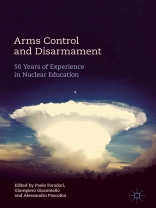This volume is a collection of contributions by world-leading experts in the nuclear field who participated in the educational activities of the International School on Disarmament and Research on Conflicts (ISODARCO). It features some of most prominent scholars and practitioners who contributed in fundamental ways to shaping policies, strategies, theories, scholarly studies, and debates in the field of non-proliferation and disarmament. On the occasion of ISODARCO’s 50th anniversary this book revisits a selection of contributions that capture the pressing issues during the five decades of continuous engagement in disarmament and non-proliferation education.
สารบัญ
Introduction.- P
art I – Early Attempts to Arms Control: 1966-1974 .- 1. Technological Aspects of World Security (1966).- 2. Anti-Ballistic Missiles (1968).- 3. International Relations and Game Theory (1970).- 4. The Origins of Mirv (1972).- 5. The Importance of Agreements (1972).- 6. The Fallacy of Thinking Conventionally about Nuclear Weapons (1976).- 7. Strategic Arms Limitation and Military Strategic Concepts (1976).-
Part II – The Hard Times: 1978-1989 .- 8. Radiation Hazards in Fission Fuel Cycles (1978).- 9. The Dilemma of European Theatre Nuclear Arms Control (1980).- 10. Nuclear Arms Control: Obstacles to Agreement (1982).- 11. International Systemic Features Inhibiting Disarmament and Arms Control (1982).- 12. The Problem of the Nuclear First-Use Option (1988).- 13. The Problem of Extended Deterrence and International Security (1988).- 14. Minimum Deterrence and International Security (1988).-
Part III – After the Cold War .- 15. Weapons on Earth and in Space(1992).- 16. The Non-Proliferation Treaty and the German Choice Not to Proliferate (1992).- 17. US-Russian Cooperation on Fissile Material Security and Disposition (1996).- 18. The New Verification Game and Technologies at our Disposal (1996).- 19. Nuclear Deterrence, Disarmament, and Nonproliferation (2010).- 20. Nuclear Abolition or Nuclear Umbrella? Choices and Contradictions in US Proposals (2010).-
Conclusion.
เกี่ยวกับผู้แต่ง
Paolo Foradori is Associate Professor of Political Science, School of International Studies, University of Trento, Italy.
Giampiero Giacomello is Associate Professor of Political Science, Department of Political and Social Sciences, University of Bologna, Italy.
Alessandro Pascolini is a theoretical physicist and senior scholar at the University of Padua, Italy. He is vice-president of ISODARCO.












